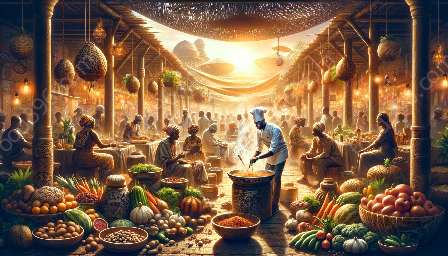Introduction
Ancient African cuisine is a rich tapestry that weaves together the diverse cultures, traditions, and histories of the African continent. From the Nile River to the savannas, from the lush rainforests to the deserts, the culinary heritage of Africa is as varied and vibrant as the continent itself. In this exploration of ancient African cuisine, we will delve into the history, ingredients, and cultural significance of traditional African food.
African Cuisine History
The history of African cuisine is deeply intertwined with the continent's rich and complex past. African cuisine has been shaped by centuries of trade, migration, and cultural exchange. The flavors and ingredients of ancient African cuisine reflect the diverse regions and cultures of the continent, from the Berber traditions of North Africa to the indigenous dishes of sub-Saharan Africa.
African cuisine history is also marked by the legacy of colonialism and the influence of external culinary traditions. The introduction of new ingredients and cooking techniques from Europe, Asia, and the Americas has contributed to the evolution of African cuisine, creating a fascinating fusion of flavors and culinary practices.
Traditional African Dishes
The traditional dishes of ancient African cuisine are a testament to the resourcefulness and creativity of African cooks throughout history. Staple ingredients such as grains, tubers, and legumes form the foundation of many African dishes. From couscous in the Maghreb to fufu in West Africa, these ingredients have sustained generations of Africans and continue to be central to African cuisine.
Meat, poultry, and fish also play a significant role in traditional African cuisine, often prepared with aromatic spices and seasonings. Dishes such as tagines, jollof rice, and injera showcase the diverse culinary traditions found across the continent, each with its own unique blend of flavors and ingredients.
Cultural Significance of Food in Africa
Food holds a profound cultural significance in Africa, serving as more than just sustenance. It is a symbol of hospitality, celebration, and community. Traditional African meals are often shared communally, emphasizing the importance of family and community ties.
The preparation and consumption of food are also intertwined with rituals, ceremonies, and traditions that reflect the spiritual and social values of African societies. From the elaborate feasts of the Ashanti people to the coffee ceremonies of Ethiopia, food is an integral part of African culture and heritage.
Conclusion
Ancient African cuisine offers a captivating journey through the history and culinary traditions of the African continent. From the ancient civilizations of Egypt and Nubia to the vibrant cultures of West Africa and the Swahili coast, the flavors and aromas of traditional African dishes continue to delight and inspire. As we explore the diverse ingredients, flavors, and cultural significance of ancient African cuisine, we gain a deeper appreciation for the culinary heritage of Africa and the integral role of food in shaping African societies.

